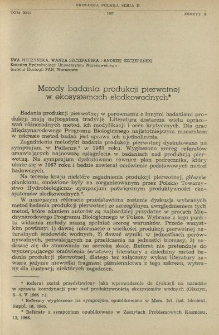
Object
Title: Metody badania produkcji pierwotnej w ekosystemach słodkowodnych
Creator:
Pieczyńska, Ewa ; Szczepańska, Wanda ; Szczepański, Andrzej
Date issued/created:
Resource type:
Subtitle:
Metody badania produkcji pierwotnej ; Methods of investigating primary production in freshwater ecosystems
Contributor:
Polska Akademia Nauk. Komitet Ekologiczny
Publisher:
Place of publishing:
Description:
Pages 123-138 ; 24 cm ; Bibliographical references (pages 135-137) ; Abstract in English
Type of object:
Abstract:
A discussion is given different methods of examining the primary production of associations in inland waters, taking into consideration plankton, periphyton, macrophytes and mixed associations. The following groups of methods were distinguished:1) Analysis of increases in the biomass of producers and calculation of actual production based on known or assumed characteristics of the association of producers.a) calculation of production from biomass and turnover;b) ca1culation of production from measurements of increase in biomass in time (one particular case in this group of methods is calculation of the production of macrophytes on the basis of maximum yearly biomass).2) Analysis of environmental changes taking place under the influence of photosynthesis processes and calculation on this basis of the photosynthesis value.a) measurements of variations in the amount of oxygen in an environment;b) measurements of variations in the amount of carbon dioxide direct analyses by chemical or physical methods and indirect analyses of variations in the amount of C02 reflected in variations in pH or conductivity);c) measurements of variations in the amounts of certain biogens.3) Analysis of the amount of carbon assimilated by plants during the process of photosynthesis (method of calculation of primary production using 14C).4) Analysis in indices of producers biomass and ca1culation of their production on the basis of a knowledge of factors limiting this production (e.g. calculation of production on the basis of information of the amount of chlorophyll and amount of solar energy per unit of surface of the water body).The paper discusses in greater detail several methods chosen from the point of view of the possibility of their application on a wider scale in the investigations carried out in Poland under the International Biological Programme. For mass comparati1e studies in eutrophic environments the application of the oxygen method of light and dark bottles for plankton and periphyton was proposed (in the case periphyton the necessity of analysing the amount of substrate suitable for colonisation was emphasised) and methods of investigating production on the basis of estimation of maximum biomass in the case of macrophytes.In discussing the oxygen method atention was drawn to the possible sources of error limiting the range of its application and stress laid on the necessity for a large number of repeats to eliminate non-directional deviations (accidental deviations) caused by the lack of uniformity of the material.
Relation:
Volume:
Issue:
Start page:
End page:
Detailed Resource Type:
Resource Identifier:
oai:rcin.org.pl:127055 ; ISSN 0424-7205
Source:
MiIZ PAN, call no. P.3259 ; click here to follow the link
Language:
Language of abstract:
Rights:
Creative Commons Attribution BY 3.0 PL license
Terms of use:
Copyright-protected material. [CC BY 3.0 PL] May be used within the scope specified in Creative Commons Attribution BY 3.0 PL license, full text available at: ; -
Digitizing institution:
Museum and Institute of Zoology of the Polish Academy of Sciences
Original in:
Library of the Museum and Institute of Zoology of the Polish Academy of Sciences
Projects co-financed by:
Access:
Object collections:
- Digital Repository of Scientific Institutes > Partners' collections > Museum and Institute of Zoology PAS > Scientific Journals
- Digital Repository of Scientific Institutes > Literature > Journals/Articles
Last modified:
Feb 4, 2022
In our library since:
Jun 15, 2020
Number of object content downloads / hits:
63
All available object's versions:
https://rcin.org.pl./publication/101432
Show description in RDF format:
Show description in RDFa format:
Show description in OAI-PMH format:
| Edition name | Date |
|---|---|
| Z. 2. Metody badania produkcji pierwotnej w ekosystemach słodkowodnych / Pieczyńska E., Szczepańska W., Szczepański A. | Feb 4, 2022 |
Objects Similar
Kajak, Zdzisław
Gliwicz, Zbigniew Maciej
Kajak, Zdzisław
Gliwicz, Zbigniew Maciej
Wiśniewski, Rajmund Jan
Woroniecka, Urszula
Stańczykowska, Anna
Pieczyński, Eligiusz

 INSTYTUT ARCHEOLOGII I ETNOLOGII POLSKIEJ AKADEMII NAUK
INSTYTUT ARCHEOLOGII I ETNOLOGII POLSKIEJ AKADEMII NAUK
 INSTYTUT BADAŃ LITERACKICH POLSKIEJ AKADEMII NAUK
INSTYTUT BADAŃ LITERACKICH POLSKIEJ AKADEMII NAUK
 INSTYTUT BADAWCZY LEŚNICTWA
INSTYTUT BADAWCZY LEŚNICTWA
 INSTYTUT BIOLOGII DOŚWIADCZALNEJ IM. MARCELEGO NENCKIEGO POLSKIEJ AKADEMII NAUK
INSTYTUT BIOLOGII DOŚWIADCZALNEJ IM. MARCELEGO NENCKIEGO POLSKIEJ AKADEMII NAUK
 INSTYTUT BIOLOGII SSAKÓW POLSKIEJ AKADEMII NAUK
INSTYTUT BIOLOGII SSAKÓW POLSKIEJ AKADEMII NAUK
 INSTYTUT CHEMII FIZYCZNEJ PAN
INSTYTUT CHEMII FIZYCZNEJ PAN
 INSTYTUT CHEMII ORGANICZNEJ PAN
INSTYTUT CHEMII ORGANICZNEJ PAN
 INSTYTUT FILOZOFII I SOCJOLOGII PAN
INSTYTUT FILOZOFII I SOCJOLOGII PAN
 INSTYTUT GEOGRAFII I PRZESTRZENNEGO ZAGOSPODAROWANIA PAN
INSTYTUT GEOGRAFII I PRZESTRZENNEGO ZAGOSPODAROWANIA PAN
 INSTYTUT HISTORII im. TADEUSZA MANTEUFFLA POLSKIEJ AKADEMII NAUK
INSTYTUT HISTORII im. TADEUSZA MANTEUFFLA POLSKIEJ AKADEMII NAUK
 INSTYTUT JĘZYKA POLSKIEGO POLSKIEJ AKADEMII NAUK
INSTYTUT JĘZYKA POLSKIEGO POLSKIEJ AKADEMII NAUK
 INSTYTUT MATEMATYCZNY PAN
INSTYTUT MATEMATYCZNY PAN
 INSTYTUT MEDYCYNY DOŚWIADCZALNEJ I KLINICZNEJ IM.MIROSŁAWA MOSSAKOWSKIEGO POLSKIEJ AKADEMII NAUK
INSTYTUT MEDYCYNY DOŚWIADCZALNEJ I KLINICZNEJ IM.MIROSŁAWA MOSSAKOWSKIEGO POLSKIEJ AKADEMII NAUK
 INSTYTUT PODSTAWOWYCH PROBLEMÓW TECHNIKI PAN
INSTYTUT PODSTAWOWYCH PROBLEMÓW TECHNIKI PAN
 INSTYTUT SLAWISTYKI PAN
INSTYTUT SLAWISTYKI PAN
 SIEĆ BADAWCZA ŁUKASIEWICZ - INSTYTUT TECHNOLOGII MATERIAŁÓW ELEKTRONICZNYCH
SIEĆ BADAWCZA ŁUKASIEWICZ - INSTYTUT TECHNOLOGII MATERIAŁÓW ELEKTRONICZNYCH
 MUZEUM I INSTYTUT ZOOLOGII POLSKIEJ AKADEMII NAUK
MUZEUM I INSTYTUT ZOOLOGII POLSKIEJ AKADEMII NAUK
 INSTYTUT BADAŃ SYSTEMOWYCH PAN
INSTYTUT BADAŃ SYSTEMOWYCH PAN
 INSTYTUT BOTANIKI IM. WŁADYSŁAWA SZAFERA POLSKIEJ AKADEMII NAUK
INSTYTUT BOTANIKI IM. WŁADYSŁAWA SZAFERA POLSKIEJ AKADEMII NAUK


































